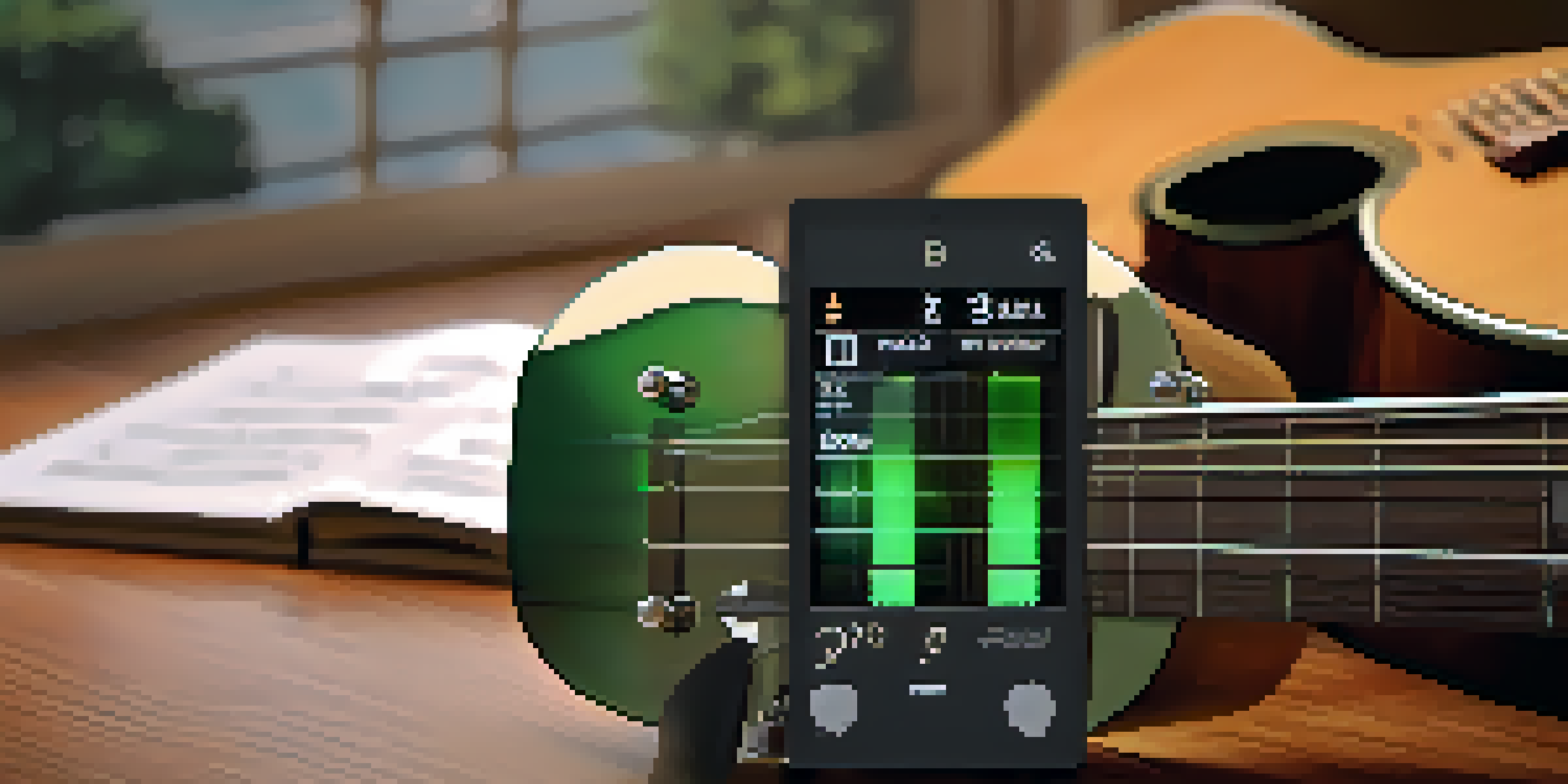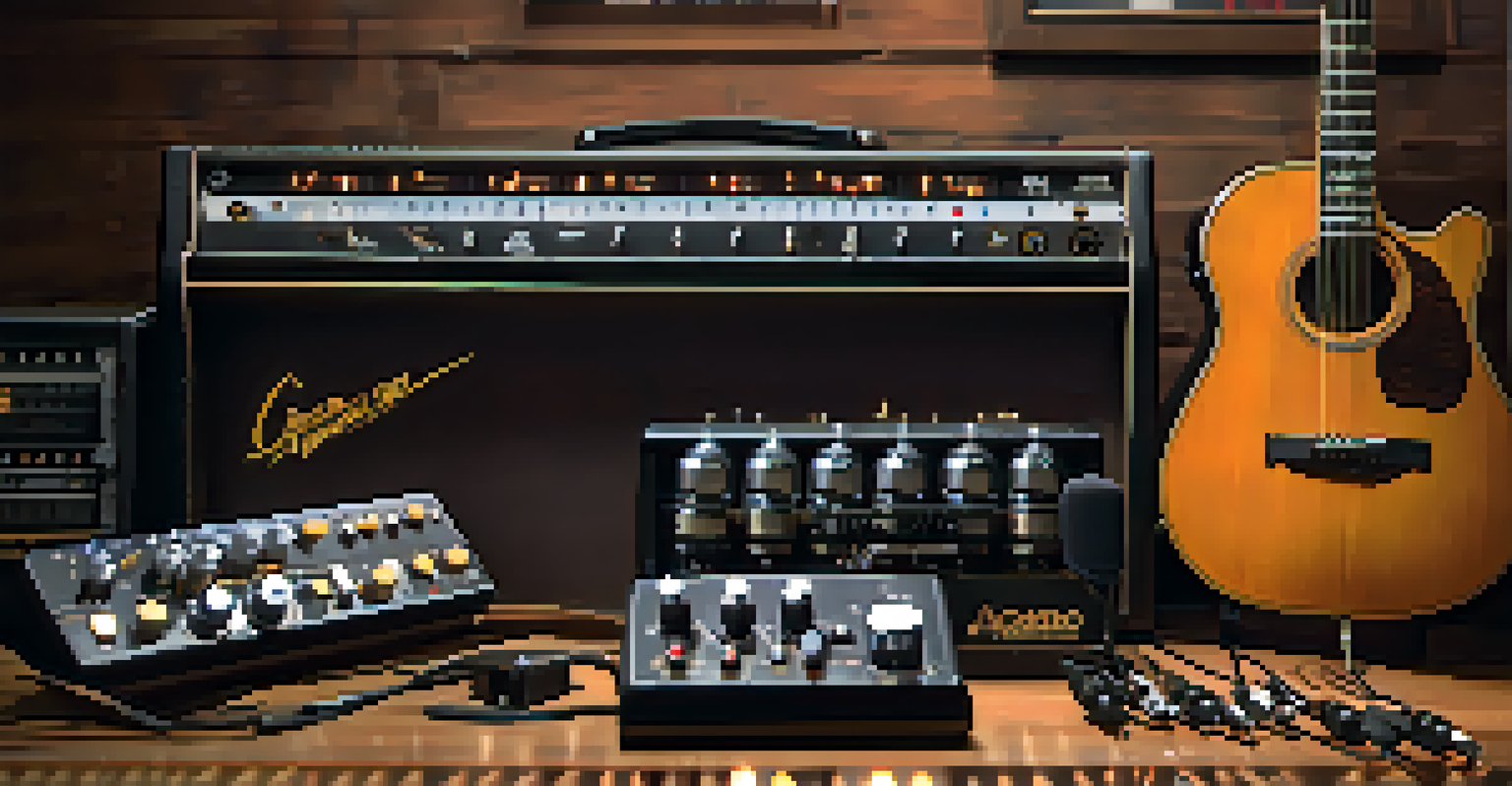The Impact of Digital Tuners on Guitar Playing Accuracy

Understanding Digital Tuners and Their Purpose
Digital tuners are electronic devices that help musicians tune their instruments accurately. Unlike traditional tuning methods, which rely on ear training and pitch recognition, digital tuners provide precise pitch readings. This technology offers visual feedback, making it easier for guitarists to achieve the perfect pitch without second-guessing themselves.
Music can change the world because it can change people.
These tuners often feature a display that shows whether a note is flat, sharp, or in tune, which is particularly helpful for beginners. As a guitarist, using a digital tuner means you can spend less time struggling with tuning and more time playing your favorite songs. It’s like having a musical GPS that guides you to the right note every time.
The ease of use and accuracy of digital tuners have made them a popular choice among musicians at all levels. Whether you’re a seasoned pro or just starting out, having a reliable tuner can significantly impact your performance and overall enjoyment of playing.
How Digital Tuners Improve Tuning Accuracy
Digital tuners enhance tuning accuracy by measuring the frequency of the sound waves produced by each string. They can detect even the slightest variations in pitch, ensuring that every note played is spot-on. This level of precision is particularly valuable when performing with other musicians, where even a small discrepancy can throw off the entire group.

For instance, if you’re jamming with friends and one guitar is slightly out of tune, it can disrupt harmony and make the music sound disjointed. By using a digital tuner, you can quickly align your instrument with the correct pitch, creating a more cohesive sound. It’s like tuning into the same radio station; everything sounds better when you’re on the same frequency.
Digital Tuners Enhance Accuracy
Digital tuners provide precise pitch readings, making it easier for musicians to achieve accurate tuning and improve their overall performance.
Moreover, many digital tuners offer alternative tuning settings, allowing guitarists to experiment with various tunings easily. This opens up new creative avenues and encourages players to explore different musical styles, ultimately enhancing their playing accuracy and versatility.
The Role of Digital Tuners in Live Performances
In live performances, timing and tuning are crucial. Digital tuners play a vital role in ensuring that guitars are perfectly tuned before stepping on stage. The pressure of performing live can often lead to last-minute tuning adjustments, and having a digital tuner at hand can make this process quick and efficient.
The beautiful thing about learning is that no one can take it away from you.
Imagine you're about to play your big solo, and you notice a string is slightly off. With a digital tuner, you can resolve the issue in seconds, helping you maintain your confidence and focus. This reliability can be a game-changer, especially in high-stakes performances where every second counts.
Additionally, many musicians use clip-on digital tuners that attach directly to the guitar headstock, allowing for discreet tuning between songs. This convenience means you can stay in the spotlight while ensuring your instrument sounds its best, ultimately enhancing the audience's experience.
Digital Tuners and Musical Education
Digital tuners are excellent tools for musical education, particularly for aspiring guitarists. They provide immediate feedback on pitch accuracy, helping students develop their listening skills and ear training. Instead of just relying on their ears, learners can visually see whether they're hitting the right notes, which accelerates the learning process.
For example, a student might struggle to identify a flat note through ear training alone, but with a digital tuner, they can quickly see the discrepancy and make adjustments. This instant feedback loop fosters a deeper understanding of tuning and pitch control, essential skills for any musician.
Essential for Live Performances
Digital tuners allow musicians to make quick tuning adjustments during live performances, ensuring confidence and focus on stage.
Moreover, many music schools and online guitar courses incorporate digital tuners into their curriculum, encouraging students to utilize technology in their practice. This integration not only makes learning more interactive but also prepares students to perform in a digital world where accuracy and precision are increasingly important.
Comparing Digital Tuners to Traditional Tuning Methods
While traditional tuning methods, such as tuning forks or pitch pipes, have their merits, digital tuners offer significant advantages in accuracy and convenience. Traditional methods often rely on the musician's ear, which can be affected by various factors like environment noise or fatigue. Digital tuners eliminate these variables, allowing for consistent results every time.
For instance, when using a tuning fork, you might be able to tune one string perfectly, but the other strings may still be slightly off due to ear fatigue. A digital tuner, on the other hand, can quickly assess the pitch of all six strings in seconds, ensuring that every note is perfectly aligned. It’s like having a trusted assistant who’s always there to help you stay in tune.
However, it's important to note that while digital tuners are incredibly helpful, developing a good ear for music is still essential. Musicians should strive to balance technology with traditional skills, ensuring they can tune their instruments even without a device in hand. This combination of skills is what makes a well-rounded guitarist.
The Accessibility of Digital Tuners
One of the most remarkable aspects of digital tuners is their accessibility. They come in various forms, from simple clip-on tuners to more advanced pedal tuners for electric guitars. This variety means that no matter your budget or preference, there’s a digital tuner out there to suit your needs.
With the advent of smartphone apps, tuning has become even more convenient. Many guitar players now rely on apps that provide digital tuning capabilities right on their phones. This means that you can have a tuner readily available at all times, whether you’re at home, at a gig, or jamming with friends.
Accessible Tools for Learning
With various forms and smartphone apps available, digital tuners have made tuning more accessible, encouraging more people to learn and play guitar confidently.
This accessibility has democratized guitar playing, allowing more people to pick up the instrument and play confidently. The barrier to entry has lowered significantly, enabling beginners to start their musical journey with the help of technology that was once only available to seasoned musicians.
Future Innovations in Digital Tuning Technology
As technology continues to evolve, we can expect exciting innovations in the realm of digital tuners. Companies are constantly working to improve accuracy, battery life, and user experience, making these devices even more effective for guitarists. Future tuners may include features like automatic tuning adjustments based on playing style or even machine learning algorithms that help identify common tuning issues.
Imagine a tuner that can analyze your playing and suggest the best tuning methods based on the style of music you're performing. Such advancements could revolutionize how guitarists approach their craft, making it easier than ever to achieve perfect pitch and explore new musical territories.

Moreover, as digital tuners become more integrated with other musical technology, such as effects pedals and recording software, the possibilities are endless. Musicians will have access to a comprehensive toolkit that enhances their performance and creativity, ultimately pushing the boundaries of music-making.